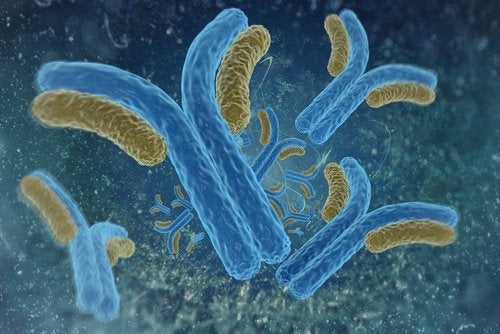What are antigens and antibodies?

Our immune system produces antibodies when it detects harmful elements, called antigens. An antigen is a foreign substance that the immune system recognizes as a threat.

Antigens and antibodies are part of the immune system, defending it, as is the case with antibodies, or attacking it and causing the activation of the immune response, as is the case with antigens. Therefore, our immune system produces antibodies when it detects harmful elements, called antigens.
An antigen is a foreign substance that the immune system recognizes as a threat. The great variety of antibodies that our body can synthesize is due to the random combinations of a set of genes that encode the different binding sites of antibodies to antigens.
Table of Contents
Antigens and antibodies
Antibodies, also called immunoglobulins, are used by the immune system to identify and neutralize these foreign substances in the body, which are antigens.
B lymphocytes are responsible for synthesizing antibodies when antigens are detected. Antigens can be both substances that come from outside and substances that have been formed in our body.
Histocompatibility antigens (HLA) are formed in our body and are unique to each individual, although without becoming exclusive to a single individual. They are found in cells and tissues. For this reason, when a cell or an organ of one person comes into contact with the lymphocytes of another person, they will recognize the HLA as non-self and destroy them.
Antibodies, as we have said, are proteins synthesized by the immune system when it detects harmful elements, called antigens. Just as there are different types of antigens, there are different types of antibodies. Each type of antibody defends the body against a certain class of antigen.
What is the structure of antibodies like?
The structure of all antibodies is very similar, since they all have a protein in their composition whose characteristic shape is the “Y”. For this reason, the antibodies will show this shape.
In addition, they present some variations in the ends of said protein, which is what makes the difference to antibodies. This part of the protein is called the hypervariable region and, thanks to it, each variety of antibody binds to a different antigen. The moment an antibody encounters an antigen that is complementary to it, it recognizes it and marks it for other members of the immune system to attack.
What is the function of antibodies?
Antibodies play the role of protecting the body, since they are part of the immune system. For this reason, in one way or another they attack the intruder by detecting it in the body.
Antibodies do their job in three different ways:
- Preventing the entry of pathogens into cells to prevent them from damaging them.
- Triggering pathogens to be killed by macrophages and other cells.
- Causing the pathogen to be destroyed directly by activating other immune responses.
What structure do antigens have?
Antigens have a three-dimensional structure and a specific area of binding with antibodies, which is called the epitope . This means that there is a large number of antibodies for each possible antigen, since the same antigen can have different epitopes.
These binding sites are a fundamental part of the structure of antigens. This is because they are the parts that can be recognized by an antibody that is specific to it and thus activate the immune response. However, antigens have areas called immunodominant. These are the areas of the antigen to which most antibodies bind.
Role of antigens in the immune response
You should know that not all antigens are capable of activating the immune response, since this also depends on antibodies. If they stimulate the immune response, they are called immunogens.
These antigens are substances that our body is not able to recognize and therefore rejects them. They are considered as pathogens that have specific antibodies as complementary.
Conclusion on antigens and antibodies
Each antibody is assigned a specific antigen, that is, they are complementary. However, they are complementary to destroy themselves, since the antibodies recognize their complementary antigens and, at that moment, the immune response will be activated to be able to destroy the pathogen.


